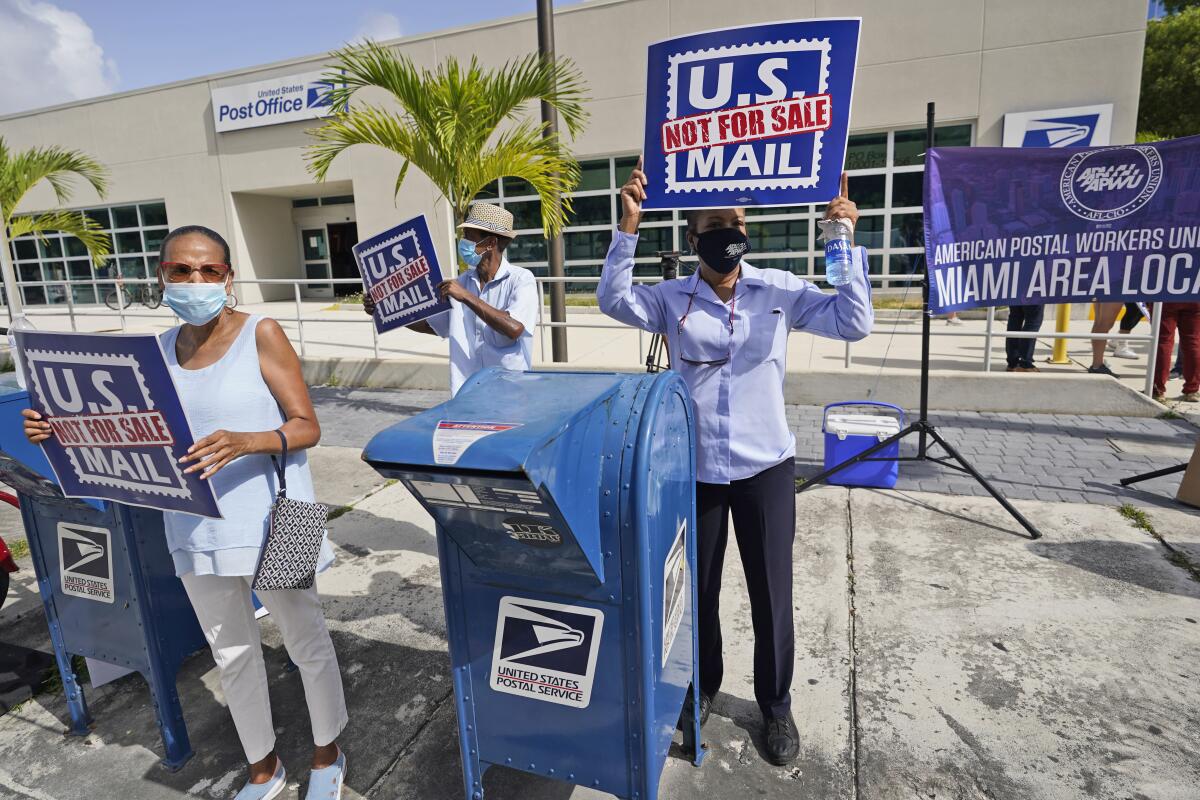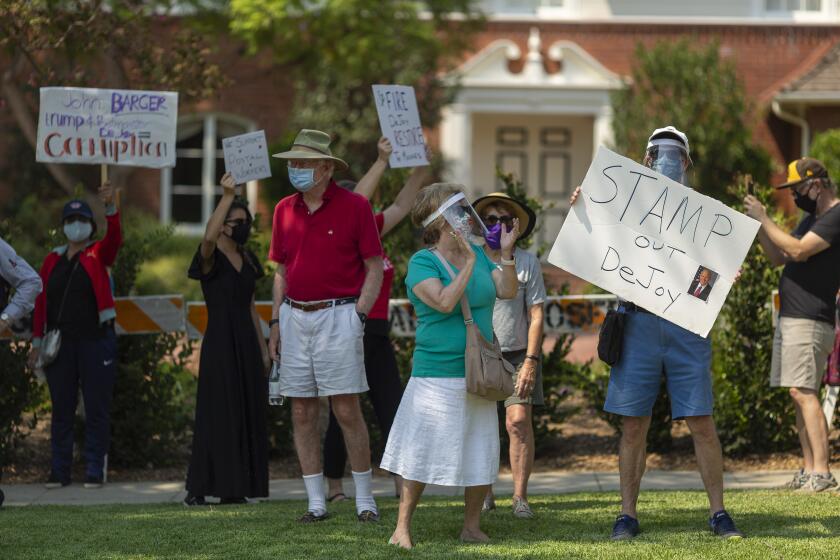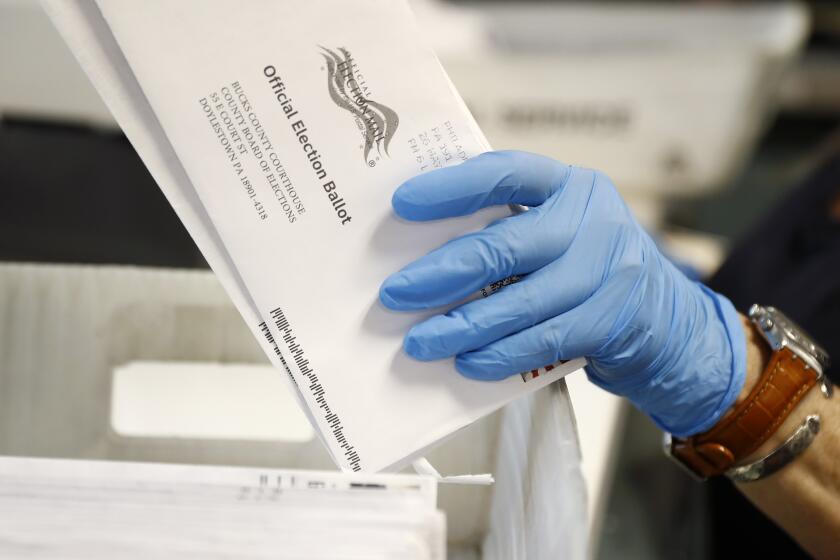U.S. officials see no signs of foreign targeting of mail-in vote, despite Trump’s claims

- Share via
WASHINGTON — U.S. officials say there has been no intelligence to suggest that foreign countries are working to undermine mail-in voting and no signs of any coordinated effort to commit widespread fraud through the vote-by-mail process, despite numerous claims made by President Trump in recent months.
The officials at multiple federal agencies stopped short of directly contradicting Trump, but their comments Wednesday made it clear they had not seen evidence to support his statements that voter fraud will be rampant and that the expected surge in mail-in ballots because of the coronavirus makes the November election especially vulnerable to foreign interference.
Trump, for instance, tweeted July 30 that mail-in voting was proving to be a “catastrophic disaster” and added: “The Dems talk of foreign influence in voting, but they know that Mail-In Voting is an easy way for foreign countries to enter the race. Even beyond that, there’s no accurate count!”
But a senior official with the Office of the Director of National Intelligence, asked on a conference call with reporters Wednesday about the threat of foreign countries manufacturing their own ballots or amplifying disinformation about the integrity of the vote-by-mail process, said there was no information or intelligence that any adversary was “engaged in any kind of activity to undermine any part of the mail-in vote.”
A senior FBI official said the agency had not to date seen a coordinated, nationwide effort to corrupt mail-in voting. The official also said, given the varied election systems across the country, that it would be “extraordinarily difficult” to tamper with results in a measurable way. But the official said the FBI remained committed to investigating any fraud that emerges.
The officials were not authorized to speak by name on the matter and requested anonymity.
John M. Barger is brother to Supervisor Kathryn Barger and a Republican donor. As a Postal Service governor, his life is suddenly filled with complaints and picketers.
Three of the primary agencies tasked with countering threats to America’s voting system arranged the briefing at a critical time in the electoral process, with little over two months left before election day and with mail-in voting starting in weeks. Trump has made unsubstantiated claims that the election will be marred by fraud and is refusing to commit to accepting the results.
Democrats say the agencies haven’t been forthcoming with the public about possible threats, noting that the risk of foreign interference was underscored by a recent Senate report containing new details of Russian meddling in 2016.
The officials who spoke did not mention Trump in answering questions about threats to the vote-by-mail process, but their answers to reporters’ questions about the topic countered some of his more incendiary claims about possible fraud.
In a separate speech Wednesday hosted by the Center for Strategic and International Studies, Deputy Atty. Gen. Jeffrey Rosen confirmed that the U.S. has “yet to see any activity intended to prevent voting or to change votes” but is encountering, as in 2016, foreign efforts to influence American public opinion and undermine confidence in the elections.
Deep-pocketed and often anonymous donors are pouring over $100 million into an intensifying dispute about whether it should be easier to vote by mail.
“We cannot escape the reality that the opportunities for malign foreign influence in our elections are far-flung, so it remains a challenge for Americans as voters,” Rosen said.
Even without active efforts to corrupt the vote-by-mail process, intelligence officials have issued public warnings about foreign countries that they say have a vested interest in the election. Officials said this month that they have assessed that Russia is working to denigrate Joe Biden, Trump’s Democratic presidential opponent. They have also said China prefers to see Trump lose, regarding him as unpredictable, but have not detailed any specific steps Beijing had taken to interfere in the election.
Officials said Wednesday they were aware that the 2020 election presented unique challenges, including an influx of mail ballots that could lead to a potential weeks-long period of uncertainty as votes are counted.
But they emphasized the significant efforts that have been made since 2016 to improve communications and sharing of threat information with state and local election officials.
Get our L.A. Times Politics newsletter
The latest news, analysis and insights from our politics team.
You may occasionally receive promotional content from the Los Angeles Times.
They also touted the use of threat-detection devices placed on state and some local election networks as having increased the ability to detect suspicious activity targeting such systems, although experts have noted these devices are limited to detecting known threats.
A senior official with the Department of Homeland Security’s cybersecurity agency said cyber activities targeting elections have so far been routine and limited to scanning and probing for vulnerabilities.
“We’re way ahead of where we were in 2016, to even be able to understand what that activity looks like,” the official said.
The official also characterized current activities as “relatively consistent and largely unsuccessful” and noted there have been no incidents similar to the 2016 breach of Illinois’ voter registration system, in which Russian hackers were suspected of gaining entry but not making any changes to voter data ahead of the election.
More to Read
Get the L.A. Times Politics newsletter
Deeply reported insights into legislation, politics and policy from Sacramento, Washington and beyond. In your inbox twice per week.
You may occasionally receive promotional content from the Los Angeles Times.












